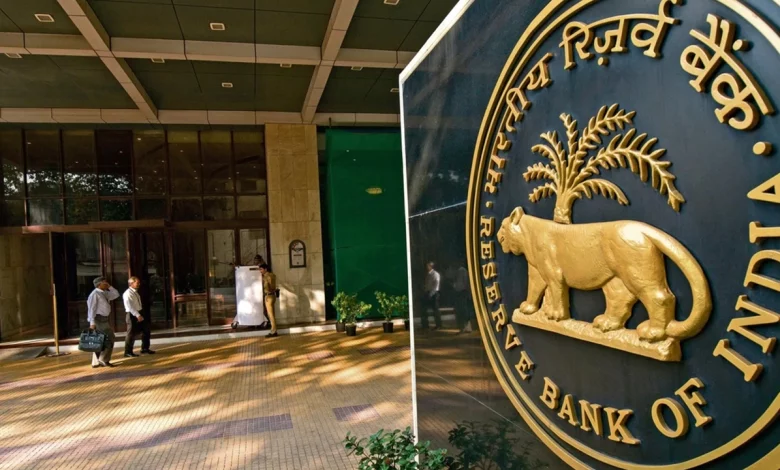Daily Current Affairs for UPSC
RBI’s Half Yearly Report on Management of Foreign Exchange Reserves
Syllabus- Indian Economy [GS Paper-3]

Context- According to RBI’s Half Yearly Report on Management of Foreign Exchange Reserves: October 2022 – March 2023, its gold reserves reached 794.64 metric tonnes in FY 22-23, an increase of nearly 5% over FY 21-22 (760.42 metric tonnes).
Key Highlights-
- Reserves in total:
-
-
- According to the RBI, 437.22 lots of gold abroad are held with the Bank of England and the Bank of International Settlements (BIS), and 301.10 lots of gold is held locally.
- The nation had gold reserves of $45.2 billion and total forex reserves of $578.449 billion as of March 31, 2023.
- At the end of March 2023, the proportion of gold in the total forex Reserves increased to approximately 7.81 percent in terms of value (in USD).
-
- Just Purchased:
-
- The RBI purchased 34.22 lots of gold in FY 23 (65.11 lots of gold in 2022).
- Between FY 2019 – FY 2021, RBI’s gold stores were 228.41 tons.
- The World Gold Council’s regional CEO for India claims that the RBI is one of the top five central banks buying gold.
Which additional banks are purchasing gold?
- The World Gold Council (WGC) claims that emerging market economies’ central banks are the primary purchasers of gold.
- The WGC report expressed that in 2022, Individuals’ Bank of China announced the first expansion in quite a while of gold stores since September 2019.
- China has been generally a huge purchaser of gold.
- Middle Eastern central banks, including Egypt, Qatar, Iraq, the United Arab Emirates, and Oman, significantly increased their gold reserves in 2022.
- The Central Bank of Uzbekistan’s gold reserves increased by 34 tonnes by the end of 2022, making it a net buyer of gold.
- In January-March 2023, the Monetary Authority of Singapore was the biggest single purchaser of gold after it added 69 tons to its gold stores
Why is the RBI storing up gold?
- Counter Methodology against Negative Loan fee:
-
- At the point when the RBI has unfamiliar cash (USD) in its stores then it contributes these dollars to buy US Govt. bonds that it pays interest on.
- However, the rise in US inflation has resulted in a negative real interest rate on these bonds.
- The genuine loan cost is the pace of revenue a financial backer, saver or moneylender gets (or hopes to get) in the wake of considering expansion (genuine premium = ostensible premium less expansion rate).
- The demand for gold has increased during this period of inflation, and the Reserve Bank of India (RBI), as a holder of gold, can reap a healthy return even in difficult economic times.
- Geopolitical Uncertainty as a Protector: Some of the most prominent global suppliers of goods, such as Russia and China, have decreased their acceptance of the dollar as a currency due to the uncertainties brought on by the war between Russia and Ukraine and the conflicts between the United States and China.
- RBI suffers a loss if the dollar it holds depreciates or weakens in comparison to other currencies.
- Gold, on the other hand, has a much longer shelf life than other forms of currency due to its intrinsic value and limited supply.
- Expand Forex Stores: Gold performs better during times of crisis and serves as a better long-term value store because it is a safer, more secure, and more liquid asset.
- Gold has a global value which is straightforward, and it very well may be exchanged whenever.
What role does gold play in the economy?
- Gold as a Reserve Currency: For the greater part of the 20th century, gold filled in as the world’s reserve currency.
- Until 1971, the United States relied on the gold standard, which mandated equivalent gold reserves to back up its paper currency.
- Since the gold standard has been discontinued, some economists advocate returning to it due to the volatility of the US dollar and other currencies.
- Value intrinsic: Demand for gold rises during inflationary times because of its inherent value and limited supply. Because it cannot be diluted, gold maintains its value for a much longer period of time than other forms of currency.
- Gold to Increase Currency Value: The worth of a country’s cash begins deteriorating when its imports surpass its products. On the other hand, a nation that is a net exporter will see its currency appreciate.
- As this raises the worth of the nation’s complete products, a country that sends out gold or approaches gold stores will see an expansion in the strength of its cash when gold costs rise.
- Gold Can Be Used in Place of G-Sec: In the event of foreign direct investment (FDI), a nation’s central bank can sterilize the market with Gold or use it for open market operations (OMO).
- G-Sec can be substituted for gold in either of these operations.





.png)



